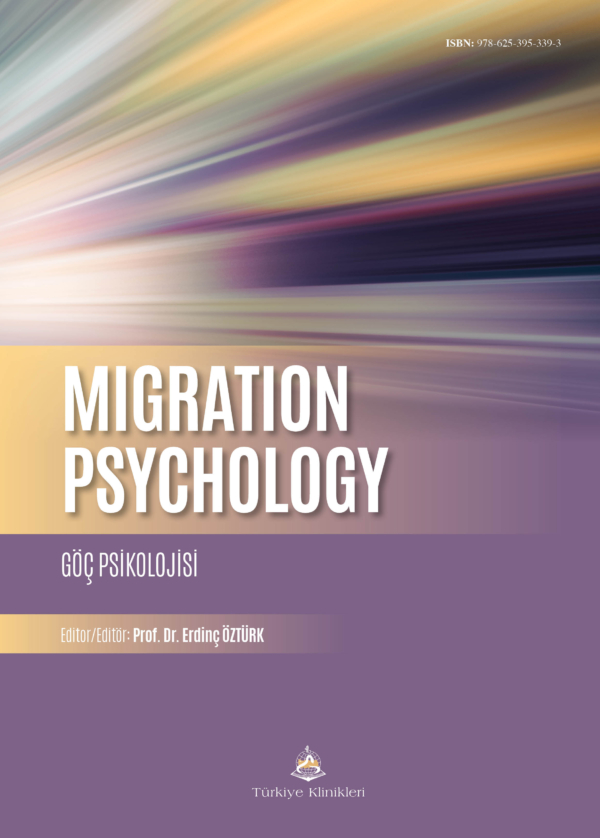Dear Scientists,
Migration, as a transnational escape experience from transgenerational traumatic experiences, is the silent footprints of escaping from a dissociative revolution in societies controlled by global monolithic cultures, psychosocial oppression and traumatic experiences! The phenomenon of migration is a transnational and transboundary life experience with every psychosocial dimension, every component and every dynamic. Today, with the massive increase in the number of migrants and refugees all over the world, ”migration psychology” in modern psychotraumatology and dissoanalysis theory has entered a new theoretical structuring process with clinical and theoretical studies based on trauma and dissociation. It is a great honour for my academic identity that the ”Dissoanalytic Migration Theory” and ”Dissoanalytic Migration Manifesto”, which have been structured by me, have attracted great national and international attention!
In terms of dissoanalytic migration theory, migrations at all times in the world are the efforts of the masses to emancipate themselves from the “obedient psychosocial mode” and even to become individuated in the face of oppression, wars, terrorist attacks and genocides! The migration odyssey and migration trauma is one of the most fundamental topics of clinical psychology and psychiatry. The migration experience, inherently traumatic from pre-migration through migration and post-migration stages, is a journey that profoundly impacts migrants’ identities, consciousness, and memories, either by reinforcing them or by assimilating even eliminating them! ”Migration melancholy” encompasses feelings of hopelessness, despondency, resentment, and sorrow typically experienced in short phases by individuals as they leave or are compelled to leave their homelands while still loving them!
The ”Dissoanalytical Migration Manifesto” is both a transcentennial and transgenerational analysis and prediction that includes important turning points on the permanent, short- or long-term psychosocial transformation of individual and mass human mobility. The migration phenomenon, the most mobile psychosocial component in the history of humanity and civilization, serves as a resolute declaration, even a manifesto, against natural disasters, persistent oppressions, dominant leaders, dysfunctional families, and dysfunctional nations! In all migrations, subjects experience a psychosocial rupture, just like in dissociation, and try to regain their autonomy and relational reciprocity after a transboundary life experience!
In all times of the world and in all societies of the world where transgenerational development succumbs to transgenerational fossilization, compassion, justice and loyalty, as well as science, art and civilization, begin to disappear. An advanced segment of dysfunctional societies within the monolithic culture hegemony can exceed the average and create a development-oriented break only through ”dissociative revolutions” and “dissociative emancipations” or ”developmental migrations” that occur after long periods of time. Dissociative revolutions, dissociative emancipations and developmental migrations are all challenging actions taken by individuals and societies that have been controlled and ruled by oppressing and traumatizing them for many years, to cut their symbiotic ties with their dictators and even the monolithic cultures that exploit them, to move away from the ideas of terrorism, war and genocide, and to become liberated and individuated. With these challenging actions, a psychosocial consciousness alliance is achieved, empathy-oriented positive child-rearing styles are adopted, and a peace-oriented progressive new human and social profile is created. According to the dissoanalytic migration theory, dissociative revolutions, dissociative emancipations and developmental migrations create an irreversible psychosocial change in all individuals and societies so that the subjects can no longer be themselves!
Prof. Dr. Erdinç ÖZTÜRK
Editor
İstanbul University-Cerrahpaşa Institute of Forensic Sciences and Legal Medicine, Department of Social Sciences, Psychotraumatology and Psychohistory Research Unit, İstanbul, Türkiye
Bölümler
Dissoanalytic Migration Manifesto: Obedience or Liberation in the Face of Wars, Oppression and Trauma
Erdinç ÖZTÜRK
Migration Psychology and Migration Trauma: Migration-Related Transgenerational Transmission of Trauma and Transgenerational Transfer of Psychopathology
Erdinç ÖZTÜRK, Görkem DERİN
Migration and Psychopathology
Barışhan ERDOĞAN
Psychosocial Components and Forensic Aspects of Migration
Emre ÇİYDEM, Osman CELBİŞ
Forced Migration and Family Dynamics
Hakan KARAMAN , Mehmet Engin DENİZ
Migration, Trauma, Grief and Dissociation
Aslı Dila AKİŞ
Secondary Trauma in Mental Health Professionals Working with Refugees
Hülya AYHAN
Migration Trauma and Substance Addiction
Tuğba EMEN, Selda MERCAN
Migration, Identity, Culture, and Trauma
Mustafa Şahin ÖZDEN , Can ÇALICI
Forced Migration from Psychosocial Perspective
Bengisu Nehir AYDIN
Dissociogenic Effects of Migration as a Collective Trauma on Family Dynamics
Aylin AYDIN, Şahide Güliz KOLBURAN
Family Interactions and Psychosocial Changes in the Migration Process
Osman Sezer ERİM, Tuğba TÜRK KURTÇA
Old Age and Refugees: A Trauma Perspective
Deniz IŞIKER BEDİR, Hıdır APAK


